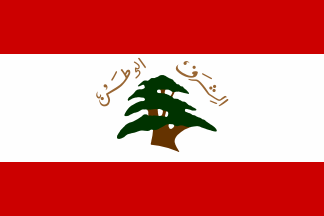|
Lebanon Crisis Of 1958
The 1958 Lebanon crisis (also known as the Lebanese Civil War of 1958) was a political crisis in Lebanon caused by political and religious tensions in the country that included a United States military intervention. The intervention lasted for around three months until President Camille Chamoun, who had requested the assistance, completed his term as president of Lebanon. American and Lebanese government forces successfully occupied the Port of Beirut and Beirut International Airport. With the crisis over, the United States withdrew. Background Arab Cold War After the end of World War II in 1945, the United States and Soviet Union were the two major world powers. Two years later, the Truman Doctrine was issued, aimed at containing the spread of communism and the Soviet Union. The Cold War is generally considered to have begun around this time. As the world divided into the Eastern (communist) and Western (capitalist) Blocs, a struggle for ideological geopolitical supremacy bet ... [...More Info...] [...Related Items...] OR: [Wikipedia] [Google] [Baidu] |
Cold War
The Cold War is a term commonly used to refer to a period of geopolitical tension between the United States and the Soviet Union and their respective allies, the Western Bloc and the Eastern Bloc. The term '' cold war'' is used because there was no large-scale fighting directly between the two superpowers, but they each supported major regional conflicts known as proxy wars. The conflict was based around the ideological and geopolitical struggle for global influence by these two superpowers, following their temporary alliance and victory against Nazi Germany and Imperial Japan in 1945. Aside from the nuclear arsenal development and conventional military deployment, the struggle for dominance was expressed via indirect means such as psychological warfare, propaganda campaigns, espionage, far-reaching embargoes, rivalry at sports events, and technological competitions such as the Space Race. The Western Bloc was led by the United States as well as a number of other First W ... [...More Info...] [...Related Items...] OR: [Wikipedia] [Google] [Baidu] |
Najjadeh Party
By the name "the rescuers" or "the helpers" ( ar, حزب النجادة , ''Hizb An-Najjadah'', ''Najjadah'', ''Najjadeh'' or ''Najjada'') is an Arab nationalist political party that appeared in Lebanon during the 1930s. Origins Lebanon in the 1930s witnessed the emergence of two paramilitary youth sport organizations of sectarian cast with clear fascist tendencies in Beirut and other Lebanese cities, the Lebanese Phalanges led by Pierre Gemayel and the Najjadah. The latter began its existence in 1933-34 as a Sunni Muslim boy-scouts organization founded and led by Muhi al-Din al-Nasuli, the editor of the influential pan-Arabist Muslim newspaper ''Bayrut'', with the purpose of protecting the Muslim community and to act as a counterweight to the Phalangists. . He often criticized the "moral chaos" in public life and adopted the supremacist motto "Arabism Above All" on his own newspaper's masthead. Al-Nasuli's ''Bayrut'' also published glowing accounts of German youth's supp ... [...More Info...] [...Related Items...] OR: [Wikipedia] [Google] [Baidu] |
Adnan Al-Hakim
Adnan Al-Hakim (died May 26, 1990) was the leader of the Najjadeh Party, an Arab nationalist party in Lebanon, for more than 30 years. He defined the politics of the party significantly. He was elected to parliament in 1956, and again in 1960 and 1968. Gallery Image:Adnan_Hakim_Jamal_Abdel_Nasser.jpg, Adnan Al-Hakim with Gamal Abdel Nasser Image:Adnan_Hakim_Airport.jpg, Adnan Hakim welcomed at the airport Image:Najjadeh Board.jpg, Najjadeh Party By the name "the rescuers" or "the helpers" ( ar, حزب النجادة , ''Hizb An-Najjadah'', ''Najjadah'', ''Najjadeh'' or ''Najjada'') is an Arab nationalist political party that appeared in Lebanon during the 1930s. Origins Lebanon in th ... General Secretary References External linksNajjadeh Party Official Website [...More Info...] [...Related Items...] OR: [Wikipedia] [Google] [Baidu] |
Saeb Salam
Saeb Salam (17 January 1905 – 21 January 2000) ( ar, صائب سلام) was a Lebanon, Lebanese politician, who served as List of Prime Ministers of Lebanon, Prime Minister six times between 1952 and 1973. Following his death, the Lebanese daily ''As-Safir'' described Salam as "most successful in dealing with the media and in presenting a particular image of himself to people on a daily basis through wearing his customary carnation ... and expounding unforgettable slogans", and that he was Lebanon's most popular prime minister after independence leader Riad Al Solh.Yehia, RanwaSalam bid farewell ''Al-Ahram Weekly''. 2 February 2000. A significant aspect of Salam was that, unlike other Lebanese leaders, he did not act as a chief over a particular area in the country. Salam fiercely advocated the unity of Lebanon. Early life and education Salam was the son of Salim Ali Salam, the scion of a prominent Sunni Islam in Lebanon, Sunni Muslim family, who was a prominent politician ... [...More Info...] [...Related Items...] OR: [Wikipedia] [Google] [Baidu] |
Rashid Karami
Rashid Abdul Hamid Karami (30 December 1921 – 1 June 1987) ( ar, رشيد كرامي) was a Lebanese statesman. He is considered one of the most important political figures in Lebanon for more than 30 years, including during much of the Lebanese Civil War (1975–1990), and he served as prime minister ten times, making him the most democratically elected prime minister in history according to the Guinness Book of World Records 2005. He was assassinated in 1987. Early life and education Rashid Karami was born in Tripoli, North Lebanon, on 31 December 1920 into one of Lebanon's most prominent Sunni political families. He was the eldest son of Abdul Hamid Karami, an architect of Lebanese independence from France. His father was also the Grand Mufti, or supreme religious judge, of Tripoli, and served as Prime Minister in 1945. Rashid Karami graduated from Cairo University with a law degree in the 1946. Career Following his graduation Karami practiced law in Cairo for three years. ... [...More Info...] [...Related Items...] OR: [Wikipedia] [Google] [Baidu] |

.png)

